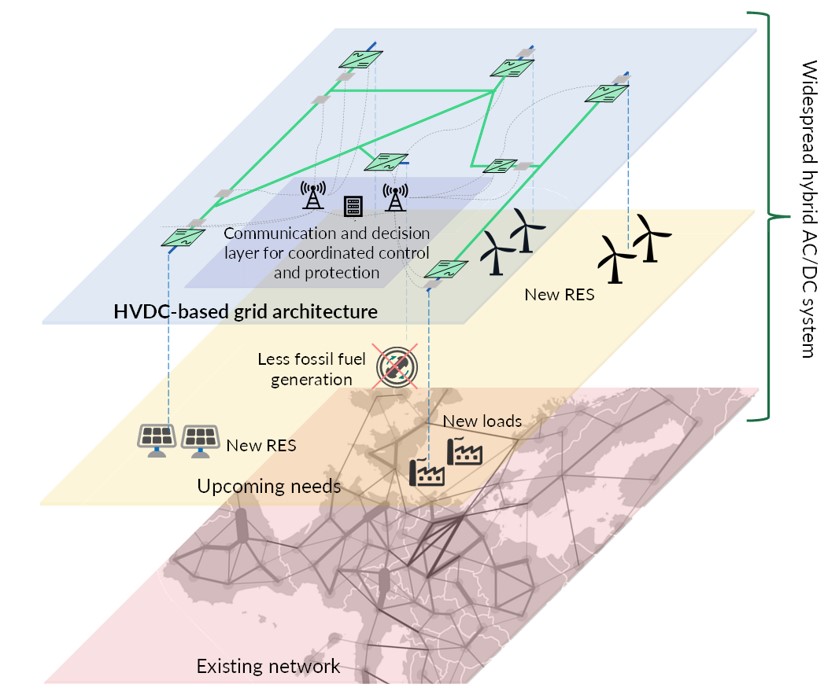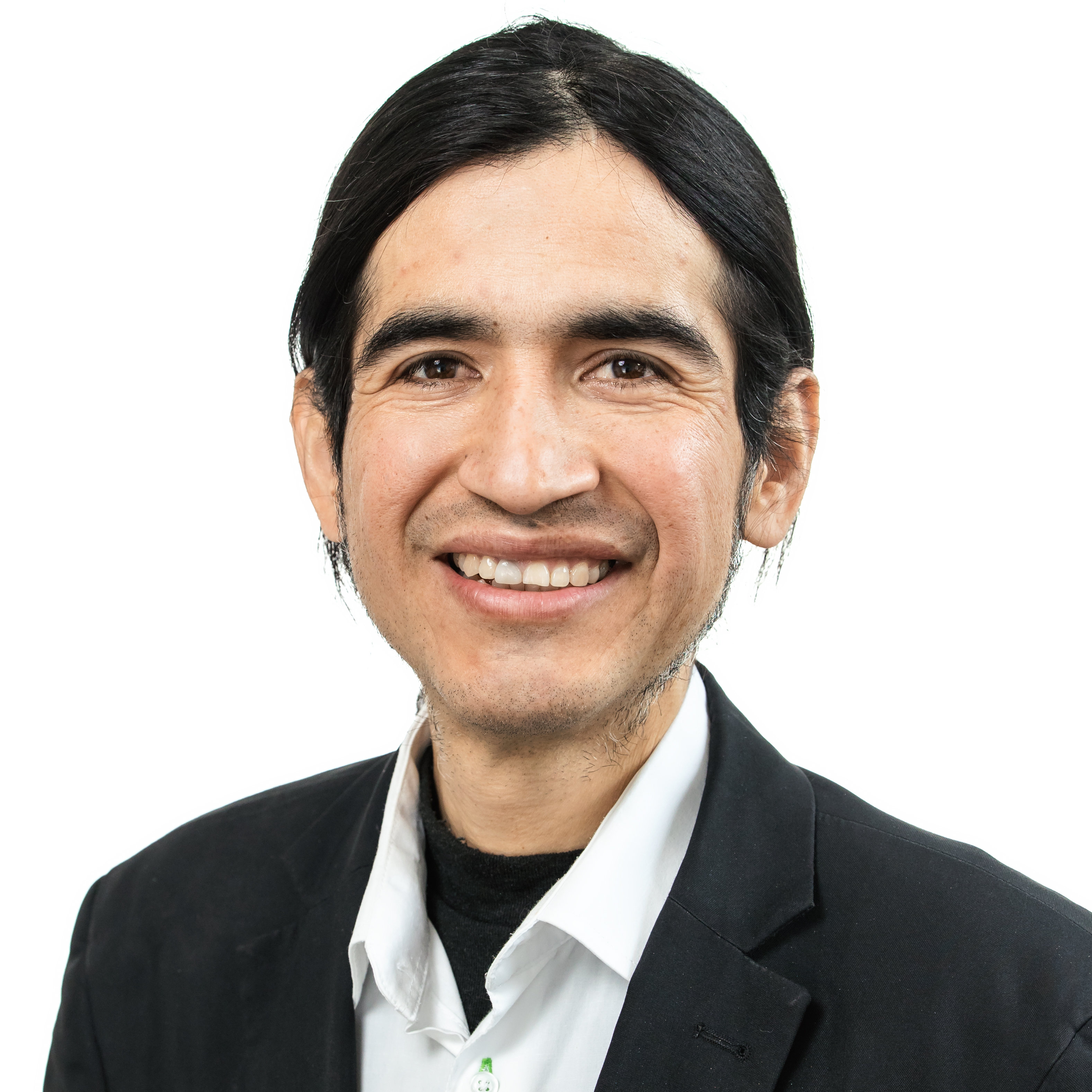HVDC-WISE
HVDC-based grid architectures for reliable and resilient WIdeSprEad hybrid AC/DC transmission systems
Overview

The HVDC-WISE project investigates concepts and proposes solutions to encourage the development of large-scale HVDC-based transmission grid infrastructures capable of bringing benefits to the existing power networks in terms of resilience and reliability, as well as integrating the upcoming large amount of renewable energy sources. This project proposes, designs, and validates HVDC-based grid architecture concepts to make the widespread deployment of reliable and resilient AC/DC transmission networks possible, thus enabling the realization of the European energy transition. The HVDC-WISE project is a multidisciplinary initiative with 14 collaborators from 11 countries representing the academic (5), transmission system operators (4), and industry (5) sectors.
Project description
The European Commission has laid forth ambitious plans for the development of renewable energy sources (RES) in order to achieve climate neutrality by 2050. This plan urges the vast expansion of offshore wind farms (OWF), with up to 300 GW expected to be installed by 2050. Given its larger capacity and power capabilities, high voltage direct current (HVDC) technology is rapidly being recognized as the most effective solution for transferring electrical energy from large offshore wind farms to onshore systems. Furthermore, shifting electricity generation from fossil fuels to wind and solar power generation causes huge changes in power flows across AC transmission networks, necessitating significant reinforcement and improved power flow controllability. The larger transmission capacity and reduced losses over long distances, along with the overhead line planning and commissioning challenges, may lead to undersea (or underground) HVDC cables being the preferable choice for onshore network expansion.
This power system upgrade for the integration of more RES, aided by HVDC systems and other power electronics (PE) devices, brings with it new problems as well as promising potential for the grid. On the one hand, the huge integration of RES connected to the grid via PE converters, the dynamics of which differ from those of conventional generating units, results in increasingly volatile power networks with more stability issues. Furthermore, when HVDC systems are used, additional inherent vulnerabilities to the entire AC/DC system security emerge. The potential cyber security concerns or high-power converter outages are examples of these vulnerabilities. On the other hand, the great controllability and quick responsiveness of HVDC systems may be used to reduce the risk and effect of various threats, resulting in “reliable and robust” integrated AC/DC power systems. It is evident that as HVDC arrangements develop in capacity and quantity, the total transmission system's stability and resilience will become increasingly dependent on them in the near future. As a result, future HVDC systems need to be specified, designed and implemented accordingly. The HVDC-WISE project intends to exploit the full potential of HVDC to improve overall transmission system reliability and resiliency (including decreasing the inherent risks of HVDC) through effective specification, design, and implementation.
Intended deliverables
• To develop a complete reliability & resilience-oriented planning toolset (metrics, methodology, and tools) with appropriate representation of different HVDC-based grid architecture concepts aiming to fulfil the TSOs’ reliability and resilience needs defined during the project.
• To identify, propose and compare different HVDC-based grid architecture concepts aiming to address TSOs’ reliability and resilience needs for widespread AC/DC systems.
• To identify, assess, and model emerging technologies for HVDC-based grid architecture concepts needed for the deployment of widespread AC/DC transmission grids.
• To validate in an in an industrially relevant environment the resilience-oriented planning toolset and the HVDC-based grid architecture concepts on three realistic use cases.
• To prepare for the adoption and deployment of the proposed solutions by the industry.
Project partners
Supergrid Institute, TenneT TSO GmbH, Scottish and Southern Energy, Comillas University, University of Strathclyde, RWTH Aachen University, EPRI Europe, Technische Universiteit Delft, Tractebel Impact Belgium S.A. (Engie Impact), University of Cyprus, Ricerca sul Sistema Energetico - RSE S.p.A., Energinet, Amprion GmbH, Statnett














TUD team

Postdoc Researcher:
Dr. M. (Mohsen) Jorjani Damghani

Postdoc Researcher:
Dr. M. (Monika) Sharma

Responsible:
Dr.ir. J. (Jose) Rueda Torres

Responsible:
Dr. A. (Alex) Stefanov

M. (Mohsen) Jorjani Damghani
Mohsen Jorjani Damghani was born in Sari, Iran, in 1992. He received his BSc and MSc degrees in electrical power systems engineering from the Amirkabir University of Technology, Tehran, Iran, in 2014 and 2016, respectively. He then joined Tarbiat Modares University (TMU), Tehran, Iran, where he received his PhD in electrical power systems engineering in 2022. He is now a postdoctoral researcher with the Intelligent Electrical Power Grids (IEPG) group at TU Delft, Netherlands. His current research interests include power systems cyber security, operation, and control.

M. (Monika) Sharma
Monika Sharma received a Ph.D. degree from Indian Institute of Technology Mandi (IITM), India in 2021. She has demonstrated research experience in fractional controllers, integer-based controllers, power converters, signal processing algorithms, control schemes of voltage source converters, heuristic/convex optimization, power distribution systems, and control systems. Apart from her Ph.D. work, she worked on two projects funded by DST and IEEE where she contributed towards smart grid analysis for Indian scenarios and testing of e-autos in hilly terrain. She has rich experience in RTDS, OPAL-RT, hardware-in-the-loop, and hands-on experience of working on tools such as NS2, MATLAB, RSCAD, RTLAB, Latex. She is currently working as a postdoctoral researcher in TU Delft and contributing to the HVDC-WISE project.